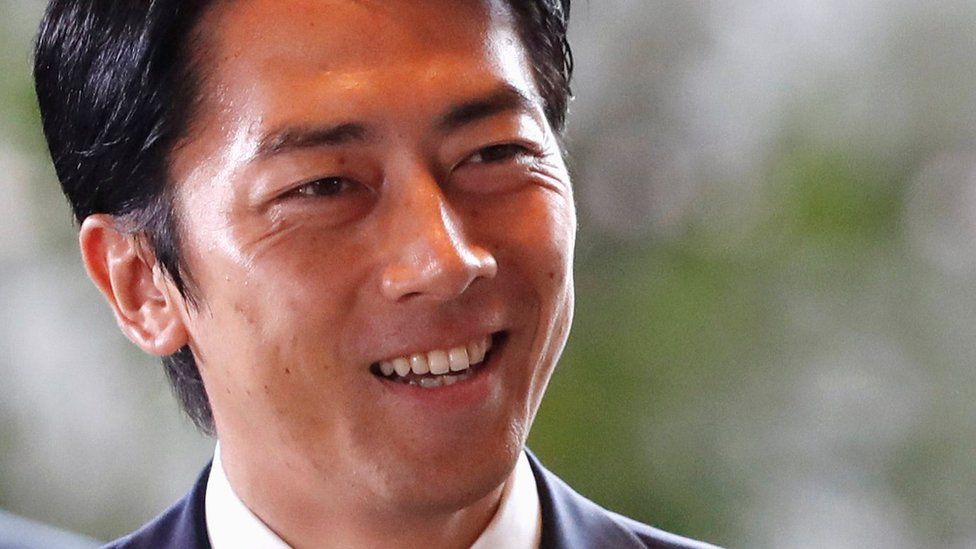Shinjiro Koizumi: A rising star in Japanese politics
- Published

Last month, Shinjiro Koizumi, a Japanese lawmaker who is the second son of popular former Prime Minister Junichiro Koizumi, grabbed headlines after he announced his marriage to a TV personality, and considered the possibility of taking paternity leave after the birth of their child.
It was a rare move in a country where women are still expected to lead their children's education, despite official efforts to improve gender equality. But it is far from the first time Mr Koizumi has found himself in the spotlight.
At the age of 38, Mr Koizumi, often referred as Shinjiro to distinguish him from his father, is the subject of constant media coverage, and regularly described as a serious candidate for the country's top job.
And, unsurprisingly, he was back in the news this week, after being named environment minister in a reshuffle by Prime Minister Shinzo Abe, becoming the third-youngest minister in a Japanese cabinet since World War Two.
Now observers are keen to see how he will perform.
"I have compared him to a 'surfer' who looks very good to the spectators on the shore but never tries to put out to sea," political analyst Atsuo Ito told the BBC.
"We will see how capable he truly is now that, as a minister, he cannot avoid the rough waves from the public."
'Young guy in a hurry'
"Well-known among America's so-called Japan hands," according to the Japan Times, Mr Koizumi has a master's degree in political science from New York's Columbia University and worked as a researcher at the Washington DC-based think tank, the Center for Strategic and International Studies.
"While Koizumi's youth, looks, sometimes populist rhetoric and media presence win him many admirers," the newspaper said, "critics note these are different qualities to those needed to govern and get things done as a cabinet minister".
Mr Koizumi, from the ruling Liberal Democratic Party, was elected to the lower house in 2009, winning the seat vacated by his father. He is the fourth generation of the Koizumi family to hold a parliamentary seat.
Until now, the most prominent position he had had in the government was as parliamentary vice-minister for reconstruction of the tsunami-hit Tohoku region.
He has previously hinted that accepting an important post too soon was a risk. But a few around him believe his eyes are already on the premiership, and he may not be willing to wait a lot to fight for it - Mr Koizumi is often rated in polls as the politician voters would most like to see as prime minister.
"He's a young guy in a hurry," one unnamed source told Reuters.
More on Japan
His announcement - at the prime minister's residence in Tokyo - that he would marry Christel Takigawa, a 42-year-old French-Japanese star known as the face of Tokyo's successful bid for next year's Summer Olympics, was widely covered by the press.
Mr Koizumi has supported allowing the use of separate surnames by married couples, which is banned by current law, and criticised some of the country's traditional customs.
He shares, however, some of Mr Abe's conservative views, and local media pointed to the fact that he had paid respects at the controversial Yasukuni Shrine for war dead in Tokyo.
Meanwhile, he has built his image as a reformer within his party while carefully trying not to offend elder colleagues and, despite being under intense public attention, has avoided expressing his opinions on key issues.
Paternity leave or not?
Experts say one aspect to watch is his position towards nuclear power. While Mr Abe - who is expected to remain as prime minister until September 2021 - is committed to it, Mr Koizumi's father has become a fierce opponent to atomic energy after the 2011 Fukushima disaster.
He may have given a sign of what is to come. "I'd like to study how we'll scrap [nuclear power plants], not how to retain them," he said at a press conference after his appointment, according to Kyodo News.
But the immediate attention is likely to focus on something else: his decision on whether or not take paternity leave when their child is born early next year. If he takes it, it would be the first time a cabinet minister has done so.
He is still thinking about it, but was quoted as saying: "Japan is rigid and outdated because society is caught up with fussing over pros and cons simply because I said I would consider [it]."
- Published30 March 2019
- Published26 July 2023